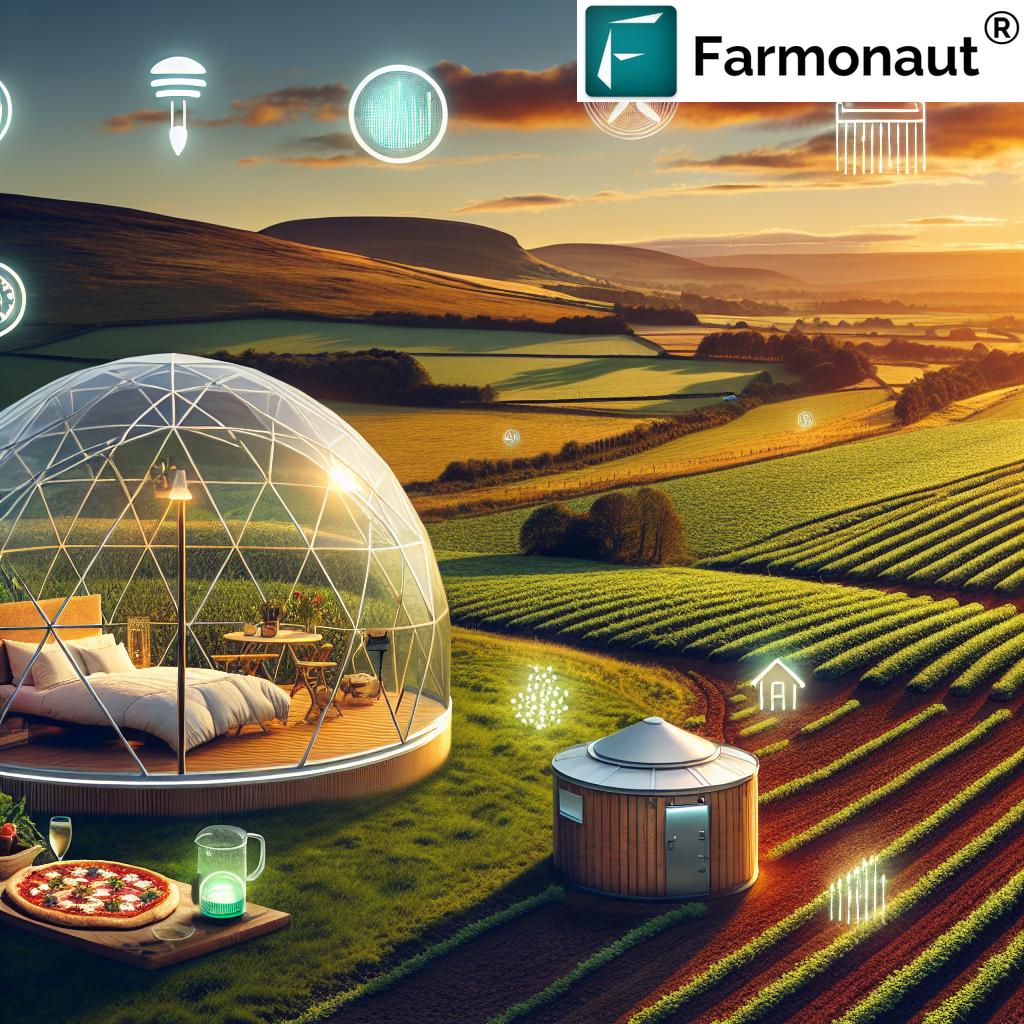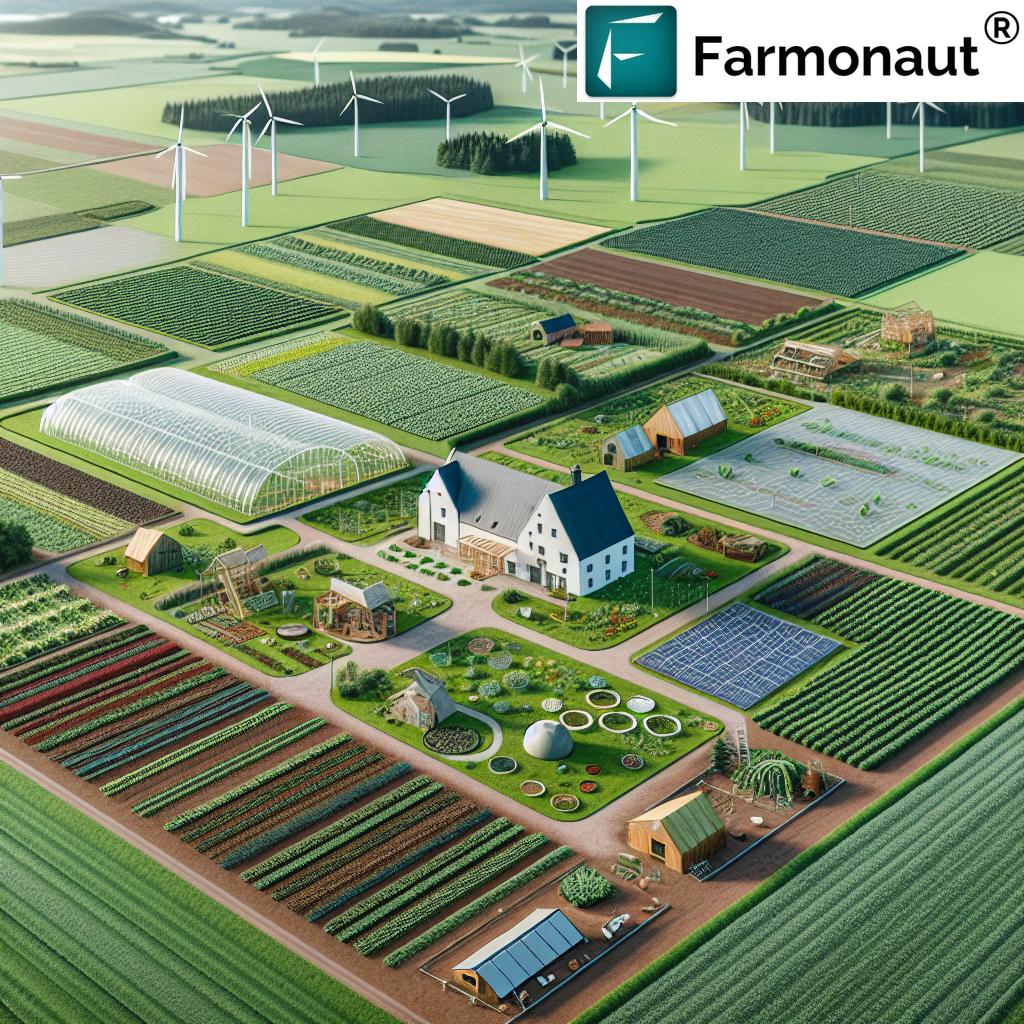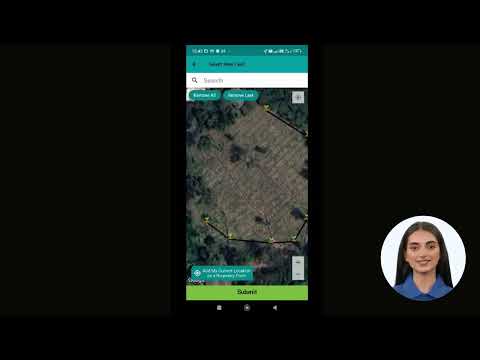Sustainable Farming in Scotland: How Precision Agriculture Technologies Are Revolutionizing Local Food Production
“Scotland’s precision agriculture technologies have increased crop yields by up to 15% while reducing water usage by 30%”
Welcome to a world where adventure meets sustainability in the breathtaking landscapes of Scotland! We’re about to embark on a journey that combines the thrill of glamping with the cutting-edge world of precision agriculture. Nestled in the heart of Wigtownshire, our destination offers a unique twist on traditional travel, blending eco-friendly accommodations with smart farming practices that are revolutionizing local food production.
As we dive into this exciting exploration, we’ll discover how precision agriculture technologies are transforming the face of farming in Scotland, creating a more sustainable and efficient future for food production. From crop monitoring systems to weather forecasting for farmers, we’ll uncover the fascinating world of agricultural data analytics that’s making waves in this picturesque corner of the world.
The Glamping Experience: A Gateway to Sustainable Farming
Our adventure begins in Portpatrick, a charming coastal village that serves as the perfect backdrop for our sustainable glamping experience. Here, we’ll find ourselves surrounded by the rugged beauty of Scotland’s landscapes while enjoying the comforts of a modern Bohemian dome. This isn’t just any ordinary holiday; it’s a chance to immerse ourselves in the world of sustainable farming while enjoying a family-friendly getaway.
As we settle into our cozy dome, we can’t help but marvel at how this unique accommodation blends seamlessly with its surroundings. The transparent roof allows us to gaze at the stars at night, connecting us with nature in a way that traditional hotels simply can’t match. But there’s more to this experience than just a comfortable stay; it’s an opportunity to learn about the innovative farming practices that are shaping the future of agriculture in Scotland.

Precision Agriculture: The Future of Farming
As we explore the surrounding area, we’re introduced to the concept of precision agriculture. This innovative approach to farming is transforming the way food is produced in Scotland, making it more sustainable and efficient than ever before. Let’s take a closer look at some of the key technologies that are making this revolution possible:
- Crop Monitoring Systems: Gone are the days of farmers relying solely on their eyes to assess crop health. Today, advanced satellite imagery and drone technology provide real-time data on crop conditions, allowing for targeted interventions and optimized resource use.
- Agricultural Data Analytics: By harnessing the power of big data, farmers can make more informed decisions about planting, harvesting, and resource allocation. This data-driven approach leads to increased yields and reduced waste.
- Smart Irrigation Solutions: Water conservation is crucial in sustainable farming, and smart irrigation systems use sensors and weather data to deliver precisely the right amount of water when and where it’s needed most.
- Soil Health Management: Advanced soil testing and monitoring technologies help farmers maintain optimal soil conditions, ensuring the long-term health and productivity of their land.
One company at the forefront of this agricultural revolution is Farmonaut. Their innovative platform offers a range of solutions that make precision agriculture accessible and affordable for farmers of all sizes. Through their android, iOS, and web applications, as well as their API, Farmonaut is empowering farmers with the tools they need to embrace sustainable farming practices.
Check out Farmonaut’s Web App: 
A Day in the Life of a Smart Farm
As part of our glamping experience, we have the unique opportunity to visit a local farm that has embraced precision agriculture technologies. Here’s what a typical day looks like on this cutting-edge farm:
- Morning Satellite Check: The day begins with the farmer reviewing satellite imagery of their fields, identifying any areas that may need attention.
- Weather Forecasting: AI-powered weather predictions help the farmer plan their activities for the day, ensuring optimal timing for tasks like planting or harvesting.
- Drone Deployment: For a closer look at specific areas of concern, drones are sent out to capture high-resolution images and gather additional data.
- Data Analysis: Using farm management software, the farmer analyzes the collected data to make informed decisions about resource allocation and crop management.
- Precision Interventions: Based on the data insights, targeted interventions are carried out, such as applying fertilizer only where it’s needed or addressing pest issues in specific areas.
This data-driven approach not only increases efficiency but also significantly reduces the environmental impact of farming operations. It’s a win-win for both the farmer and the planet.
The Impact of Precision Agriculture on Local Food Production
The adoption of precision agriculture technologies is having a profound impact on local food production in Scotland. Here are some of the key benefits we’re seeing:
- Increased Yields: By optimizing resource use and addressing issues promptly, farms are seeing significant increases in crop yields.
- Reduced Environmental Impact: Precision agriculture allows for more efficient use of water, fertilizers, and pesticides, reducing the overall environmental footprint of farming operations.
- Improved Food Quality: With better crop management, the quality of produce is improving, leading to tastier and more nutritious food for consumers.
- Enhanced Traceability: Advanced tracking systems make it easier to trace food from farm to table, increasing transparency and food safety.
- Support for Local Economies: As farms become more productive and sustainable, they contribute more to local economies, supporting rural communities.
“Sustainable glamping in Portpatrick offers guests access to over 50 miles of scenic coastal walks and 5 different smart farming systems.”
These advancements are not just benefiting large-scale operations. Thanks to companies like Farmonaut, even small and medium-sized farms can access precision agriculture technologies. This democratization of technology is crucial for creating a more sustainable and resilient food system in Scotland.
Explore Farmonaut’s Android App: 
Beyond the Farm: A Holistic Approach to Sustainability
Our glamping experience in Portpatrick offers more than just a glimpse into sustainable farming practices. It’s a holistic approach to eco-friendly living that extends to every aspect of our stay. Here’s how our adventure combines sustainability with comfort and fun:
- Eco-Friendly Accommodations: Our Bohemian dome is designed with sustainability in mind, using renewable materials and energy-efficient systems.
- Local and Sustainable Cuisine: We have the opportunity to enjoy meals prepared with locally sourced, sustainably grown ingredients, giving us a true farm-to-table experience.
- Outdoor Adventures: With over 50 miles of scenic coastal walks at our doorstep, we can explore the stunning Scottish landscape while learning about local ecosystems.
- Educational Experiences: Interactive workshops and tours provide insights into sustainable farming practices and the importance of preserving Scotland’s natural beauty.
- Relaxation with a Purpose: Even our downtime contributes to sustainability, with amenities like a wood-fired hot tub that uses responsibly sourced fuel.

The Role of Technology in Sustainable Tourism
Just as precision agriculture is revolutionizing farming, technology is also transforming the tourism industry, making it more sustainable and enriching for travelers. Our glamping experience in Portpatrick is a perfect example of how technology and nature can work together to create unforgettable experiences:
- Smart Energy Management: Our dome uses intelligent systems to optimize energy use, reducing waste without compromising comfort.
- Digital Nature Guides: Apps and QR codes provide information about local flora and fauna, enhancing our understanding of the environment without the need for paper guides.
- Virtual Reality Experiences: On rainy days, we can explore virtual recreations of historical farming practices, comparing them to modern sustainable methods.
- Online Booking and Check-In: Streamlined digital processes reduce paper use and make our stay more convenient.
- Social Media Integration: We’re encouraged to share our sustainable travel experiences, inspiring others to consider eco-friendly options.
This integration of technology into our glamping adventure not only enhances our experience but also demonstrates how innovation can support sustainable tourism practices.
Hands-On Learning: Engaging with Precision Agriculture
One of the most exciting aspects of our glamping experience is the opportunity to get hands-on with precision agriculture technologies. Through interactive workshops and demonstrations, we can gain a deeper understanding of how these innovative tools are changing the face of farming:
- Drone Piloting: We have the chance to operate drones equipped with multispectral cameras, learning how they capture crucial data about crop health.
- Satellite Imagery Analysis: Using Farmonaut’s platform, we can interpret satellite images of local farms, identifying areas of concern and potential improvements.
- IoT Sensor Networks: We explore how networks of Internet of Things (IoT) sensors collect real-time data on soil moisture, temperature, and other critical factors.
- AI-Powered Decision Making: Through interactive simulations, we experience how AI algorithms process vast amounts of data to provide actionable insights for farmers.
- Robotic Farming Demonstrations: We witness demonstrations of autonomous farming robots that can perform tasks like precision weeding and harvesting.
These hands-on experiences not only educate us about precision agriculture but also inspire us to think about how technology can be applied to create a more sustainable future in various industries.
The Future of Farming and Food Production in Scotland
As we immerse ourselves in this sustainable glamping experience, we can’t help but wonder about the future of farming and food production in Scotland. The adoption of precision agriculture technologies is just the beginning of a larger transformation in the agricultural sector. Here are some trends and predictions for the future:
- Vertical Farming: In urban areas, vertical farming could become more prevalent, allowing for year-round production of fresh produce with minimal water and land use.
- AI-Driven Crop Breeding: Artificial intelligence could accelerate the development of crop varieties that are more resilient to climate change and pests.
- Blockchain for Food Traceability: Blockchain technology could provide end-to-end traceability for food products, enhancing food safety and consumer trust.
- Renewable Energy Integration: Farms could become energy self-sufficient by integrating solar, wind, and biogas technologies into their operations.
- Precision Fermentation: This technology could allow for the production of animal-free proteins, reducing the environmental impact of livestock farming.
These advancements promise to make Scottish agriculture more sustainable, productive, and resilient in the face of global challenges like climate change and food security.
Comparing Traditional and Precision Agriculture Methods
To truly appreciate the impact of precision agriculture technologies, it’s helpful to compare them with traditional farming methods. The following table illustrates the stark differences between these approaches:
| Farming Aspect | Traditional Method | Precision Agriculture Technology |
|---|---|---|
| Crop Monitoring | Visual inspection | Satellite imagery and drones |
| Weather Forecasting | Local weather reports | IoT sensors and AI predictions |
| Irrigation | Fixed schedules | Smart irrigation systems |
| Soil Health Management | Periodic soil testing | Real-time soil sensors |
| Pest Control | Scheduled spraying | Targeted application based on data |
| Yield Prediction | Historical data | AI-powered forecasting |
| Resource Management | Manual tracking | Farm management software |
This comparison clearly shows how precision agriculture technologies are enabling a more data-driven, efficient, and sustainable approach to farming in Scotland.
The Role of Education in Sustainable Agriculture
Our glamping experience in Portpatrick isn’t just about enjoying the beautiful Scottish countryside; it’s also an educational journey. The integration of precision agriculture technologies into this travel experience highlights the importance of education in promoting sustainable farming practices. Here’s how education plays a crucial role:
- Raising Awareness: By exposing visitors to sustainable farming methods, we’re raising awareness about the importance of environmentally friendly food production.
- Skill Development: Hands-on workshops provide valuable skills that visitors can apply in their own gardens or communities.
- Inspiring Future Innovators: Young visitors may be inspired to pursue careers in agricultural technology or sustainable farming.
- Promoting Sustainable Consumption: Understanding how food is produced encourages more mindful consumption habits.
- Building Community Support: Educated consumers are more likely to support local, sustainable farming initiatives.
This educational aspect of our glamping trip demonstrates how tourism can be a powerful tool for promoting sustainable practices and fostering a deeper connection between consumers and their food sources.
The Economic Impact of Precision Agriculture in Scotland
While the environmental benefits of precision agriculture are clear, it’s also important to consider the economic impact of these technologies on Scotland’s agricultural sector and rural communities:
- Increased Farm Profitability: By optimizing resource use and improving yields, precision agriculture can significantly boost farm incomes.
- Job Creation: The adoption of new technologies creates jobs in areas such as data analysis, drone operation, and agricultural technology development.
- Rural Development: As farms become more profitable and technologically advanced, they can support the growth of rural economies.
- Export Opportunities: Scotland’s expertise in precision agriculture could lead to increased exports of both agricultural products and technology solutions.
- Attracting Investment: The innovative nature of precision agriculture attracts investment in research and development, further driving economic growth.
These economic benefits demonstrate that sustainable farming practices are not just good for the environment but also for Scotland’s overall economic health.
Explore Farmonaut’s API: Farmonaut Satellite API
Challenges and Considerations
While our glamping experience showcases the many benefits of precision agriculture, it’s important to acknowledge that the transition to these new technologies is not without challenges. Some key considerations include:
- Initial Investment Costs: The upfront costs of implementing precision agriculture technologies can be significant, particularly for smaller farms.
- Digital Literacy: Farmers need to develop new skills to effectively use and interpret the data provided by these technologies.
- Data Privacy and Security: As farming becomes more data-driven, ensuring the security and privacy of sensitive agricultural data becomes crucial.
- Connectivity Issues: Many precision agriculture technologies rely on stable internet connections, which can be challenging in remote rural areas.
- Balancing Technology and Tradition: There’s a need to find a balance between embracing new technologies and preserving traditional farming knowledge and practices.
Addressing these challenges will be crucial for the widespread adoption and success of precision agriculture in Scotland.
Conclusion: A Sustainable Future for Scottish Agriculture
As our glamping adventure in Portpatrick comes to an end, we’re left with a profound appreciation for the role of precision agriculture in shaping a sustainable future for Scottish farming. The blend of traditional Scottish hospitality with cutting-edge agricultural technology has provided us with a unique perspective on the future of food production.
From the comfort of our eco-friendly Bohemian dome to the high-tech farms we’ve explored, this experience has shown us that sustainability and innovation can go hand in hand. The precision agriculture technologies we’ve encountered, from satellite imagery to AI-powered decision-making tools, are not just improving farm efficiency; they’re paving the way for a more sustainable and resilient food system.
Companies like Farmonaut are playing a crucial role in this agricultural revolution, making advanced technologies accessible to farmers of all sizes. Their commitment to affordable and user-friendly solutions is helping to democratize precision agriculture, ensuring that the benefits of these innovations can be realized across Scotland’s diverse farming landscape.
As we pack our bags and prepare to leave Portpatrick, we carry with us not just memories of a unique holiday, but also a deeper understanding of the challenges and opportunities facing modern agriculture. We’ve seen firsthand how technology can be harnessed to produce food more sustainably, protect the environment, and support rural communities.
This glamping experience has been more than just a getaway; it’s been a window into a future where technology and nature work in harmony to create a more sustainable world. As we return to our daily lives, we’re inspired to make more conscious choices about the food we eat and the way we interact with our environment.
The future of farming in Scotland is bright, and it’s clear that precision agriculture will play a pivotal role in ensuring that the country’s agricultural sector remains vibrant, productive, and sustainable for generations to come. Our adventure in Portpatrick has shown us that with the right blend of innovation, education, and respect for the land, we can create a food system that nourishes both people and planet.
FAQ Section
Q: What is precision agriculture?
A: Precision agriculture is an approach to farm management that uses information technology and specialized equipment to optimize crop yields and reduce waste. It involves collecting and analyzing data about crop health, soil conditions, and weather patterns to make more informed farming decisions.
Q: How does precision agriculture benefit the environment?
A: Precision agriculture reduces environmental impact by minimizing the use of water, fertilizers, and pesticides. It allows farmers to apply resources only where and when they’re needed, reducing runoff and pollution while conserving natural resources.
Q: Can small farms benefit from precision agriculture technologies?
A: Yes, thanks to companies like Farmonaut that offer affordable and accessible solutions, small farms can also benefit from precision agriculture. These technologies can help small farmers increase yields, reduce costs, and make more informed decisions about their operations.
Q: How does glamping relate to sustainable farming?
A: Glamping experiences like the one in Portpatrick combine eco-friendly accommodation with educational opportunities about sustainable farming practices. This allows visitors to learn about and experience precision agriculture technologies firsthand while enjoying a unique holiday.
Q: What role does artificial intelligence play in precision agriculture?
A: AI plays a crucial role in precision agriculture by analyzing large amounts of data from various sources (satellites, drones, sensors) to provide insights and recommendations. It can predict crop yields, detect plant diseases early, and optimize resource use across the farm.




